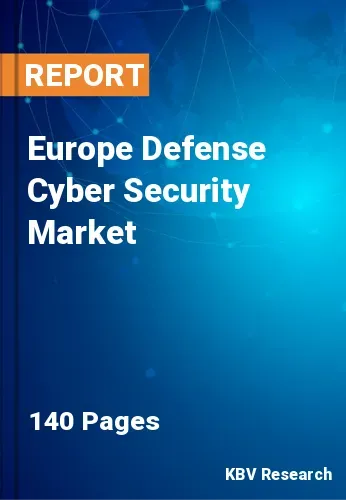The Europe Defense Cyber Security Market would witness market growth of 6.6% CAGR during the forecast period (2022-2028).
The military’s primary mission is to give security to citizens, but the rise in the number of cyberattacks can make this difficult for them to even protect their servers and compromise their confidential data. The wide adoption of information technologies has increased the likelihood of cyber-attacks and the military along with every other industry have to work together in order to spread awareness and safeguard their cyberspace with the help of resilient and strong cybersecurity technology.
These cybersecurity skills are majorly concentrated on defending, detecting, preventing, and responding to cyberattacks that may harm military systems and networks, and thereby can hamper military operations. As a result, it could be argued that the military’s key responsibility in cybersecurity is to protect information systems and communications.
The defense industry has been taking numerous steps which have regulated greater operational planning integration. It could be considered that the overall target of the military’s cybersecurity and technology strategy is to mitigate any potential issues. Due to this, the military should effectively and entirely integrate and embrace cybersecurity in their work.
The Ministry of Defense (MoD) has published the UK’s Defense AI strategy, outlining how the UK is concentrating on research & development and experimentation to revolutionize the capabilities of the UK’s armed forces. Also, the MoD has published a policy on the “Safe, ambitious and responsible” usage of AI, which contains a set of ethical principles that were developed with the MoD to prioritize the ethical considerations in the use of AI for the military. The rising usage of AI in the military and the high number of cyberattacks on defense networks will surge the demand for better cybersecurity in the defense sector, hence, boosting the defense cyber security market’s growth in the region.
The Germany market dominated the Europe Defense Cyber Security Market by Country in 2021, thereby, achieving a market value of $2,210.5 million by 2028. The UK market is exhibiting a CAGR of 5.7% during (2022 - 2028). Additionally, The France market would showcase a CAGR of 7.4% during (2022 - 2028).
Based on Deployment, the market is segmented into On-premise and Cloud. Based on Type, the market is segmented into Endpoint Security, Network Security and Content Security. Based on Offering, the market is segmented into Solution and Services. Based on Solution Type, the market is segmented into Identity & Access Management, Security & Vulnerability Management, Data loss Prevention Management, Threat intelligence & Response Management, Unified Threat Management, Enterprise risk & Compliance, Managed Security and Others. Based on Application, the market is segmented into Military, Communication Networks, Public Utilities and Others. Based on countries, the market is segmented into Germany, UK, France, Russia, Spain, Italy, and Rest of Europe.
Free Valuable Insights: The Global Defense Cyber Security Market will Hit $33.7 Billion by 2028, at a CAGR of 7.3%
The market research report covers the analysis of key stake holders of the market. Key companies profiled in the report include Intel Corporation, AT&T Inc., IBM Corporation, BAE Systems plc, Thales Group S.A., DXC Technology Company, Cisco Systems, Inc., Raytheon Technologies, Corporation (Collins Aerospace), Lockheed Martin Corporation, Northrop Grumman Corporation.
By Deployment
By Type
By Offering
By Application
By Country

Our team of dedicated experts can provide you with attractive expansion opportunities for your business.

